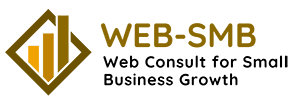The Key to Local SEO Success
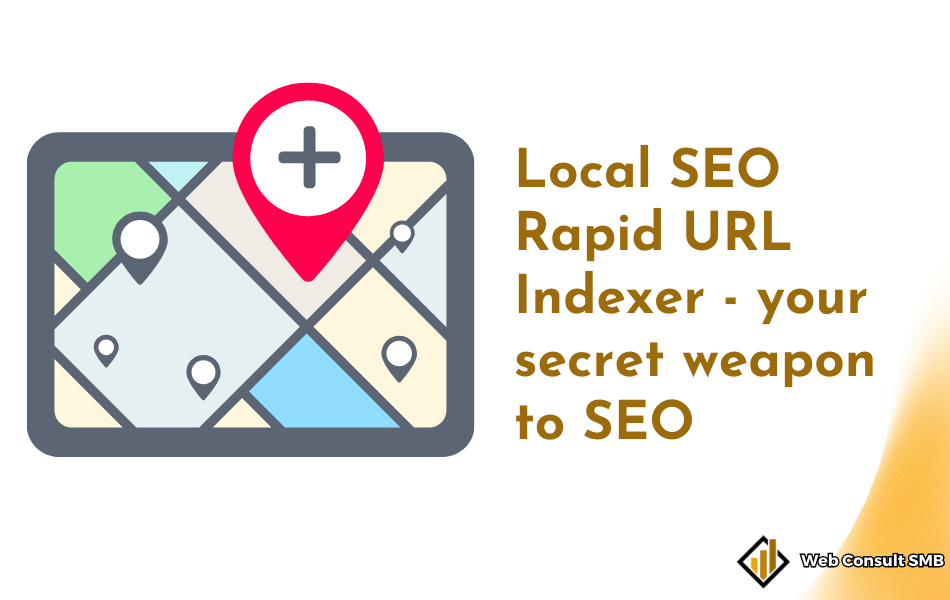

Table of Contents
Key Highlights
- Improve your local search rankings and indexing speed with a local SEO rapid URL indexer.
- Attract more local customers and boost your online presence in your local area.
- Outperform traditional methods of indexing and discover how local SEO rapid URL indexers are more effective.
- Understand the best URL structures for local SEO and learn how to use a rapid URL Indexer.
- Optimize your content for faster indexing and get practical steps for utilizing a rapid URL indexer.
Introduction
In today’s fast world of digital marketing, having a strong website’s visibility is very important for local businesses.
This is why local search engine optimization is essential. One part that is often missed is rapid URL indexing.
If you make sure that search engines find and index your website pages quickly, it helps you get more visibility. This can lead to better rankings and more customers coming to your business.
Understanding Local SEO and Its Impact on Small Businesses
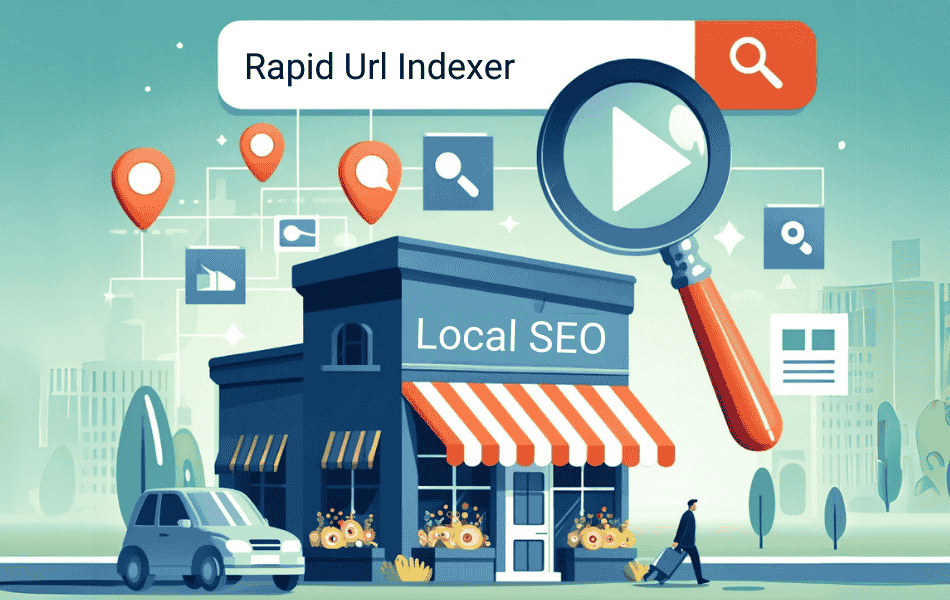
Local SEO is important for bringing in a steady flow of customers looking for businesses like yours.
It helps make sure your business shows up in local search results when people look for products or services you offer in a specific geographic area.
For example, if someone searches for “best coffee near me,” will your local coffee shop show up in the results? If it doesn’t, you may lose out on foot traffic and local sales.
SEO can help you attract those customers.
1. The Basics of Local SEO
For small and medium-sized businesses (SMBs), understanding SEO is important for long-term growth.
Here’s a simple guide:
- Optimize Your Google My Business Profile: This free tool acts as your online storefront. Make sure your business name, address, phone number, and website are correct, current, and the same everywhere.
- Focus on Local Keywords: Customers search using specific phrases like “bakery in Seattle” or “plumbing services near me.” Use these keywords naturally in your website content, meta descriptions, and social media profiles.
- Build High-Quality Local Citations: Think of citations as online mentions of your business. Having the same listings on trusted directories like Yelp, Yellow Pages, and specialty sites can greatly help your rankings.
2. How Local SEO Influences Online Visibility and Customer Engagement?
Imagine you are looking for a product or service online. What do you normally click on?
Most likely, it is one of the top search results. Local SEO helps you get those important top spots for searches in your area. This makes your business more visible to potential clients and better local rankings.
Having better visibility leads to more clicks, which brings more traffic to your website. It also helps increase customer engagement.
When your business shows up in searches regularly, it builds trust and credibility with potential customers.
The Role of URL Indexing in Enhancing Local SEO
Now that you know why local SEO is important, let’s discuss URL indexing. Search engines like Google use special methods to explore, index, and rank web pages.
It simply means that a search engine finds your web page and puts it in its database. When someone searches for something related to your business or content, search engines look at this database to decide which pages to display in the results.
If your page isn’t indexed, it won’t appear at all. This means rapid URL indexing is very important for SEO success.
1. Understanding URL Indexing
Think of URL indexing like getting your business added to an online directory. The quicker your pages are indexed, the earlier they show up in search results.
Normally, search engine indexing process can take time, even days or weeks. A rapid URL indexer speeds up this process by sending your URLs to search engines fast. It alerts them to new content or updates to current content. When indexing is faster, it can improve your search engine rankings and bring more organic traffic to your website.
2. How Rapid URL Indexing Boosts Local SEO?
For local businesses, how fast your web pages are indexed affects how visible you are online and how many customers you can reach. There is a clear link between rapid URL indexing and your SEO performance.
Using rapid indexing tools helps your business stand out, giving you the competitive edge against your competitors. Faster indexing means your business info, new products or services, special deals, and blog posts reach potential customers sooner.
This boosts your SEO performance and improves your online visibility.
Leveraging Rapid URL Indexer Tools
In today’s tough market, local businesses need all the help they can get. Using a good and fast rapid indexer tool can really make a difference.
These tools help get your website’s content noticed by search engines. This way, potential customers can find you easily and quickly.
The outcome? Better online visibility, more organic traffic, and in the end, more leads and sales.
1. Features That Define the Best Indexer Tools
Not all rapid indexer tools are the same. When you pick the best one for your business, focus on features that boost speed, efficiency, and useful reports. Here’s what to consider:
- Ease of Use: Choose a tool that is simple and easy to use, even for people who are not very technical.
- Rapid Indexing Capabilities: Look for a tool that is known for fast indexing so your web pages can be indexed quickly and effectively.
- High Indexing Success Rate: Select a tool that has a strong history of successful indexing. This will help make your SEO efforts more effective.
- Comprehensive Reporting and Analytics: Good reporting gives you important insights about your indexing progress. This can help you improve your SEO strategies.
2.Comparing Top Rapid URL Indexing Tools
Selecting the right tool is crucial for enhancing your local SEO performance. Here’s a comparison of some top options to help you choose the best fit for your needs and budget:
Tool | Features | Pricing |
Fast indexing, supports multiple URLs. Best for businesses of all sizes | $0.05 or less per index | |
Free, detailed indexing reports. Best for Businesses using Google My Business, in-depth analysis | Free | |
RankMath (SEO Plugin) | SEO tool with built-in indexing features. Best for WordPress users seeking comprehensive SEO | Subscription-based |
Advanced AI technology for optimized indexing. Best for Users requiring high-speed, accurate indexing | Subscription-based | |
Bulk URL submission, real-time indexing status. Best for Users needing efficient bulk URL indexing | Subscription-based | |
High indexation rates, white-hat methods. Best for Users focusing on safe, effective link indexing | $10/month for 5,000 links | |
High-capacity URL submission handling. Best for Users managing large volumes of URLs | Subscription-based |
Most of these tools allow you to submit a list of URLs. Some offer additional features like scheduling submissions or prioritizing specific URLs to enhance efficiency.
When choosing a tool, consider factors such as speed, cost, and how well it integrates with your existing SEO strategies.
Steps to Utilize a Local SEO Rapid URL Indexer
Using a local SEO rapid URL indexer is important for boosting your online presence. To do this well, you need to have a good plan and know how these tools fit into your overall SEO efforts.
There are a few easy steps you can follow.
- Get your website ready.
- Submit your URLs in a smart way.
Each of these steps is key to improving your visibility online and bringing in more customers.
1. Preparing Your Website
Before you submit your URLs for quick indexing, make sure your website is ready to work well. Think of this step as building a strong base:
- Technical SEO: Check if your website is mobile-friendly. It should load quickly and not have broken links.
- Create High-Quality, Relevant Content: Aim to produce useful and interesting content. This should appeal to your target audience and include relevant local keywords.
- Optimize Important Pages: Focus on getting your key pages indexed first. These include your homepage, service pages, location pages, and any new content you create.
2. Submitting URLs
Once your website is ready, you should submit your URLs for quick indexing. The steps may change a bit based on which tool you use, but here are some general tips:
- Choose a Good Rapid URL Indexer Tool: Pick a tool that fits your needs and helps improve your SEO efforts.
- Create an Account and Add Your Website: Most tools ask you to create an account and add your website or check ownership before you can submit URLs.
- Submit Your URLs: Type in the URLs that you want to be indexed. Make sure they are correct and lead to active pages on your website. Try not to give the indexer too many URLs all at once.
One of the commonly used tool is the Chrome extension – Rapid Url Indexer.
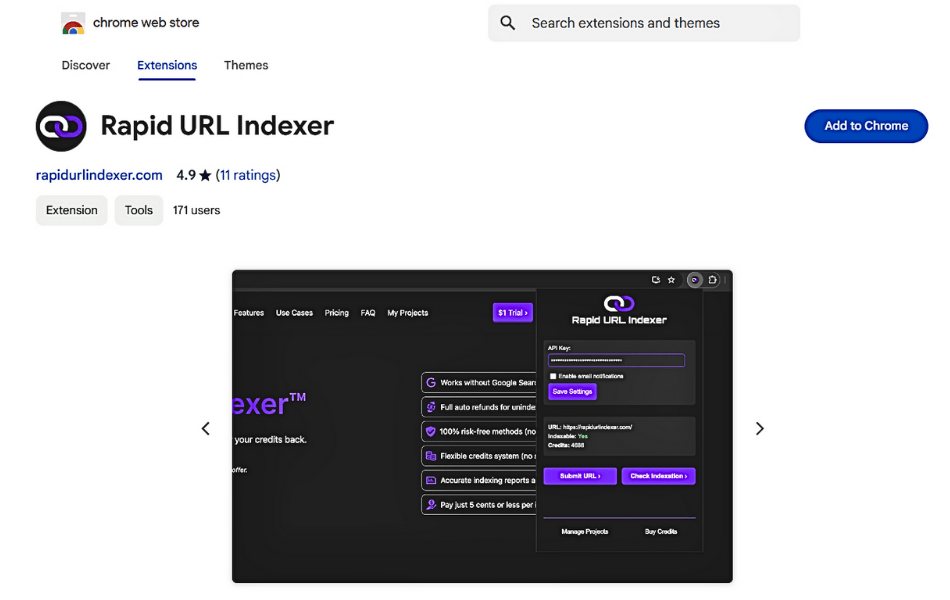
You may also use Google Search Console to submit your URL for free.
Steps to submit your URL to Google Search Console:
Step 1: Login to your account or setup one if you do not have an account, here > Start
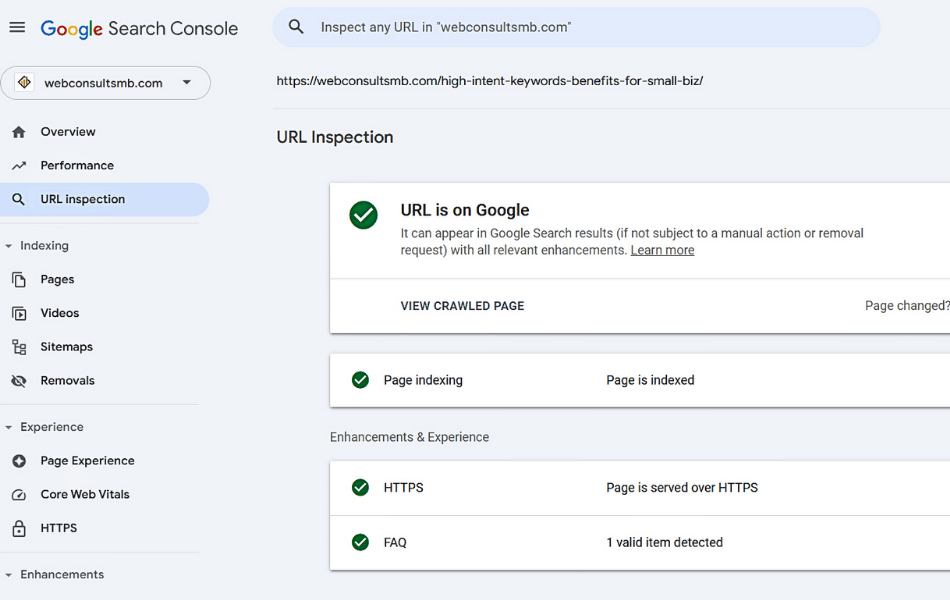
Step 2: Go to URL Inspection and keyin the URL you want indexed, at the search bar.
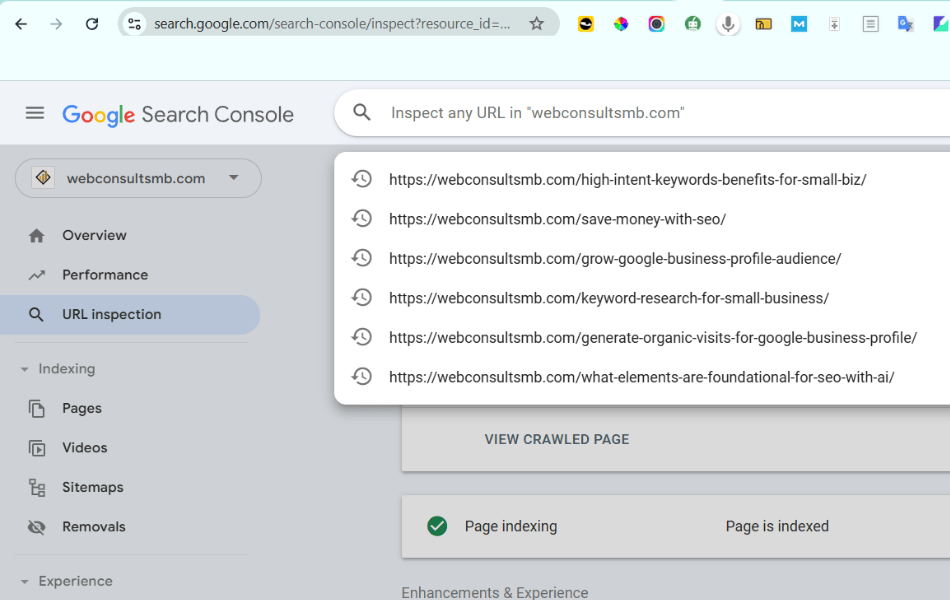
Step 3: You will be notified if the URL is indexed. If it is not, then click on the “Request Indexing” button.
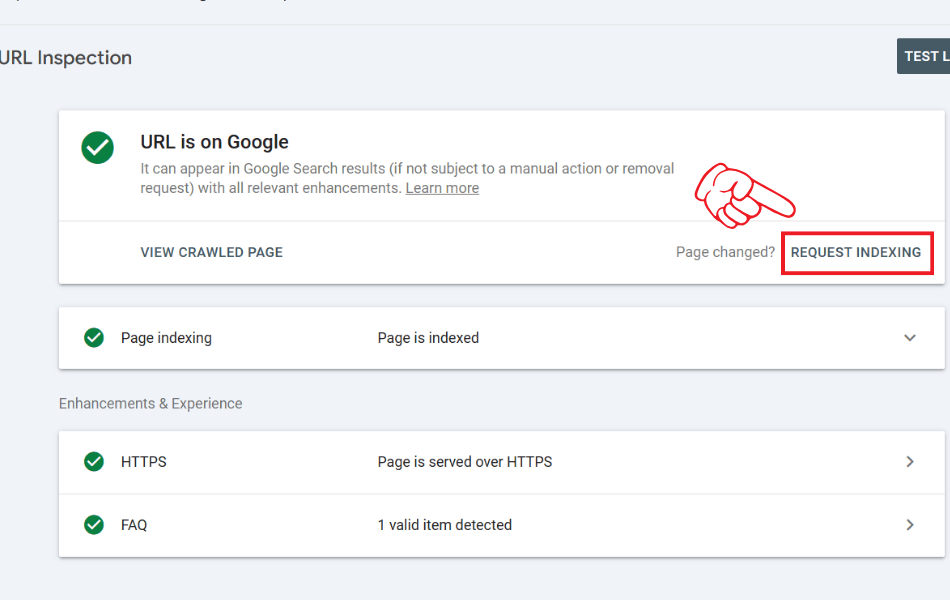
Effective URL Structure and Indexing Strategies
A rapid URL indexer can help you get your pages seen quicker, but it is only part of the bigger picture. To improve your local SEO efforts, it’s important to have a complete plan.
This should include good URL structuring and smart indexing practices.
Search engines want to give users the best and most relevant results. When you optimize your URLs and index them wisely, you’re telling search engines that your content should rank high in local searches.
1. Essential URL Structuring Tips
Your website’s URL structure is very important for local SEO. It can help improve user experience and tell search engines what your page is about. Here are some tips:
- Incorporate Local Keywords: Use keywords related to your area, like your city, state, or neighborhood.
- Keep URLs Short, Descriptive, and Readable: Make sure your URLs are simple and easy to understand for both users and search engines. Use hyphens to separate words, and steer clear of extra characters or numbers.
- Create a Hierarchy That Reflects Your Website’s Structure: Organize your URLs in a way that makes it simple for users to find their way around your site.
2. Advanced Techniques
Using a rapid indexer is important, but you can also use advanced ways to make your URLs stand out. This can help them get noticed and indexed by search engines faster:
- Build High-Quality Backlinks: When trusted sites link to your content, it shows search engines that your website is reliable. This can help with faster indexing process and better search rankings.
- Use Internal Linking to Your Advantage: Internal links help search engines find and understand your website’s structure. They can point to new or updated pages you want indexed.
- Stay Up-to-Date with Search Engine Guidelines: Search engines often change their rules and best practices. Keeping up with these changes ensures you follow the latest guidelines. This helps you optimize your content for faster results.
Conclusion
In SEO, knowing and using high intent keywords can really help small businesses.
In conclusion, it is important to know how a Local SEO Rapid URL Indexer can help boost online visibility and engagement, especially for small businesses.
Using good indexing tools can help businesses improve search engine rankings, bring more traffic, and raise overall local SEO performance.
With smart URL structuring and indexing methods, you can make even better local search results.
Stay ahead in the digital world by using the right Rapid URL
Indexer tools that fit your business needs. For expert tips on how to improve your local SEO strategy, contact our team for a consultation! grow.
These keywords are important for getting qualified leads and increasing sales.
By matching your content to what users are searching for, you can get seen more online and increase your business income.
Finding and using these keywords smartly can help your small business succeed in a tough digital world. Keep an eye on your keyword strategy and change it as needed to stay effective.
Use high intent keywords to boost your online presence and see real results for your small business.
FAQS for Local SEO Rapid URL Indexer
Can It Boost Local SEO Efforts?
Quick URL indexing improves local SEO in two ways. It helps search engines find new content quickly, leading to faster rankings and better visibility. It also boosts chances of drawing in local traffic by showing business information to the right people faster.
What is the Ideal Frequency?
Timing for using a rapid URL indexer depends on your content changes. Follow best practices: submit URLs after updates or new content. Avoid overusing the tool to prevent search engine detection.
Can It Improve Google Business Profile Listing Visibility?
Rapid URL indexing boosts online presence and improves local SEO. Fast indexing means more visitors and interactions, leading to higher search result rankings.
How Long Does a URL gets Indexed Using These Tools?
The indexing time varies due to factors like search engine crawling frequency and website setup. A rapid indexer speeds up indexing, getting your URLs in search results within hours to days.
